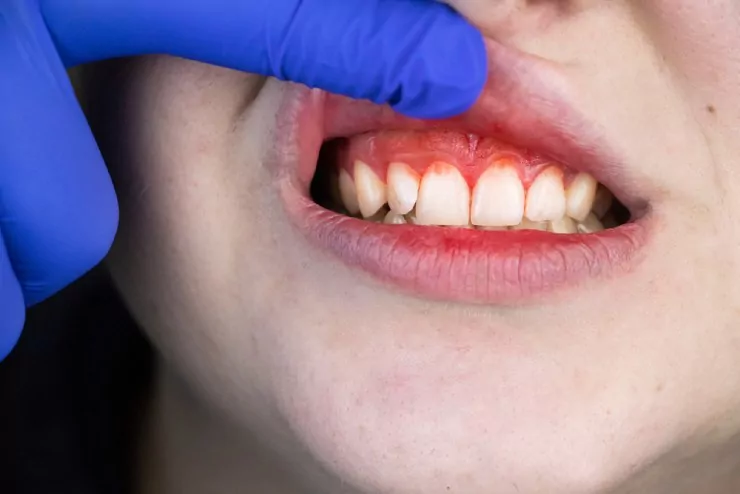
Watching your baby experience their first tooth breaking through can be both exciting and heartbreaking. The tears, sleepless nights, and constant fussiness leave many parents wondering if they’re doing enough to help. Understanding how to help a teething baby doesn’t have to feel overwhelming when you know what works and what to avoid.
Most babies begin teething around six months of age, though some start as early as three months while others don’t begin until after their first birthday. The process typically continues until around age two, when all 20 primary teeth have emerged.
Those first teeth, usually the bottom front incisors often cause the most discomfort as your baby adjusts to this new sensation.
TL;DR
Teething can be tough on babies — and their parents. This guide explains how to recognize symptoms, soothe sore gums, and know when to seek help. From cold washcloths to safe teethers, you’ll learn what works (and what to avoid) to comfort your baby through every new tooth.
Main Points:
- Teething often begins around 6 months and lasts until age 3.
- Signs include drooling, irritability, swollen gums, and sleep disruption.
- Safe remedies include chilled teething rings, gum massage, and soft foods.
- Avoid frozen objects, teething jewelry, and homeopathic tablets.
- Acetaminophen or ibuprofen can help in severe cases when used properly.
Recognizing the Signs
Your baby can’t tell you their gums hurt, but they’ll show you through their behavior. Excessive drooling often signals the start of teething, though some babies drool even before their first tooth appears. You’ll notice increased irritability, difficulty sleeping, and a sudden desire to chew on everything within reach.
Red, swollen gums are another telltale sign. Your baby might refuse their usual foods or seem less interested in nursing or bottle feeding. A low-grade fever under 100.4°F can accompany teething, but higher temperatures usually indicate illness rather than teething pain.
Safe and Effective Baby Teething Remedies
Cold compression works wonders for inflamed gums. Place a clean, damp washcloth in the refrigerator for about 30 minutes, then let your baby chew on it. The cold temperature numbs the pain while the texture provides satisfying pressure against sore gums. You can tie a knot in one end to make it easier for small hands to grip.
Teething rings made of firm rubber offer another excellent option for teething baby relief. Chill them in the refrigerator and never the freezer, as frozen objects become too hard and can damage tender gums. Avoid liquid-filled rings that might break or gel-filled varieties that can leak harmful substances. Gentle massage provides immediate comfort for many babies. After thoroughly washing your hands, you can use a safe and effective finger brush to gently massage erupting teeth and sore gums. This not only helps soothe discomfort but also gets your baby accustomed to the act of brushing. If your baby wants to chew on the brush, that’s okay—this natural response helps relieve their discomfort.
Nighttime Comfort Strategies
Learning how to soothe a teething baby at night often requires extra patience and creativity. The horizontal position can increase blood flow to the head, intensifying gum pain when your baby lies down. Try elevating the head of their crib mattress slightly using a thin towel placed under the mattress — never place pillows or blankets directly in the crib.
A warm bath before bedtime can relax your baby’s entire body while providing a pleasant distraction from teething pain. Follow this with gentle cuddling and rocking, which releases calming hormones for both of you. Sometimes the comfort of being close to you is exactly what your teething baby needs most.
Consider offering a chilled teething toy right before bed. The cold sensation can provide enough relief to help your baby drift off to sleep more easily. Keep several teething rings in rotation so you always have a cold one ready.
Food-Based Solutions
Once your baby is around six months and starts eating solid foods, cool or soft foods can double as natural teething remedies. Chilled applesauce, mashed bananas, or small pieces of cold melon provide both nutrition and gum relief. Always supervise your baby while eating and ensure pieces are appropriately sized to prevent choking.
For babies over 12 months, you can offer frozen fruit in a mesh feeder. This allows them to gnaw on cold fruit safely while getting the pressure and temperature relief their gums crave. Avoid hard foods that could break off and become choking hazards.
When to Consider Medication
Sometimes natural remedies aren’t enough, and that’s when these tips for teething baby care include safe pain relief options.
Acetaminophen (Tylenol) is safe for babies over two months old, while ibuprofen can be used for babies six months and older. Always check with your pediatric dentist and/or your pediatrician and follow dosing instructions based on your baby’s weight and age, and don’t use these medications for more than a few days without consulting your pediatrician.
Your pediatric dentist can also provide additional guidance on safe pain management options during the teething process.
Never use aspirin for babies or toddlers, as it’s linked to a serious condition called Reye’s syndrome. Similarly, avoid topical gels containing benzocaine or lidocaine — these ingredients can be dangerous for young children and may cause serious breathing problems.
What to Avoid
Several popular teething remedies can actually harm your baby. Teething necklaces, bracelets, and anklets pose serious choking and strangulation risks. The beads can break off and become lodged in your baby’s throat, while the strings can wrap around their neck during sleep.
Skip homeopathic teething tablets, which may contain harmful levels of belladonna, which is a toxic substance that can cause seizures and breathing difficulties. The FDA has issued warnings about these products after reports of serious adverse reactions.
Frozen objects might seem like the best idea to numb pain, but they’re too cold and hard for delicate gums. This includes things like frozen teething rings, ice cubes, and frozen washcloths. It’s best to stick to refrigerated items that provide cooling relief without risking injury.
How to Help a Teething Baby: Frequently Asked Questions
How long are babies in pain from teething?
Teething pain typically lasts a few days before each tooth erupts, then subsides until the next tooth begins pushing through. The entire process spans about two to three years, but pain isn’t constant — it comes and goes with each new tooth.
How do I know if my baby is crying because of teething?
Teething crying often coincides with other symptoms like drooling, gum swelling, and the desire to chew. The crying may worsen at bedtime when lying down increases pressure in the head. If crying seems excessive or is accompanied by high fever, diarrhea, or other concerning symptoms, contact your pediatrician.
What is the best position for a teething baby to sleep?
Most teething babies sleep best on their backs with their head slightly elevated. This position reduces blood flow to the head and may decrease gum pressure. Always follow safe sleep guidelines and never place pillows or loose bedding in the crib.
Final Thoughts
Stock up on multiple teething toys so you can rotate them in and out of the refrigerator. Having options ready means you won’t scramble to find relief when your baby needs it most. Clean washcloths, rubber teething rings, and appropriate pain medications should all be easily accessible.
Remember that knowing how to soothe a teething baby is often about trial and error. What works perfectly for one baby might not help another, and what works one day might not work the next. Stay patient with yourself and your baby as you navigate this challenging but temporary phase.
The discomfort is real, but so is the relief that’s coming. Each tooth that breaks through brings your baby closer to a full, healthy smile and brings you both closer to better nights of sleep. With the right tools and techniques to soothe your teething baby, you’ll both get through this milestone together.
The Super Dentists offer pediatric, orthodontic, and parent dentistry in the San Diego area. Find a location near you and schedule an appointment for your family today.











